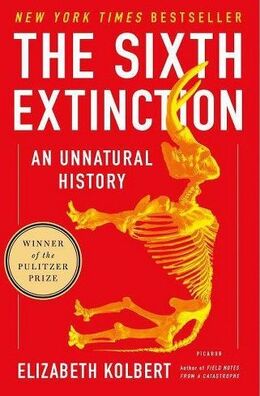|
The Sixth Extinction by Elizabeth Kolbert is a Pulitzer Prize winner (2015) for general non-fiction. I picked it up because the summary available from my library's website said it discussed the current extinction events by focusing each chapter on a specific species, and I'm a sucker for animal facts. It was the first book I finished in 2023, and it was fascinating.
Like I wrote above, the book has one chapter focused on a different species, either extinct or endangered, and discusses not only that species' predicament, but how it fits into the larger tapestry of our understanding of the current extinction event. The title is a reference to the five prior major extinctions (think meteor killing dinosaurs, which is discussed!) and how the current die-off is similar in scale. I learned so much, including that extinction wasn't even a thing people thought could happen until the 1800s. There used to be a penguin-like species in the northern hemisphere until the 1840s and I'd NEVER heard about it! Pros for this book, it was very well written (hence the Pulitzer), and I mean that it wasn't a dry, slow, jargon-heavy monster. It included deeper history as well as the author's own adventures in going to the places where the extinctions took or were taking place. Based on my summary of the book, you can also tell that I loved learning all the little details about the animals. There was even a Neanderthal chapter, which is dear to my heart as the topic of my current #amquerying project. There wasn't much I disliked about the book. Perhaps it was depressing thinking about all the species at risk or vanishing. But it's also vital to know it's happening in order to prevent it. The ebook ended at the 74% mark, and after that was all the bibliography type information non-fiction books include. That unfortunately left me in the lurch on my commute, as I'd expected at least two more chapters worth of reading. I'd recommend this book to animal lovers, people who are looking for science non-fiction that is accessible to non-scientists, and history lovers. It's not for climate change or science deniers or anyone who would be too upset about dying animals. Have you read any good non-fiction lately? Let's discuss in the comments!
0 Comments
Leave a Reply. |
Archives
April 2024
Categories
All
|


 RSS Feed
RSS Feed